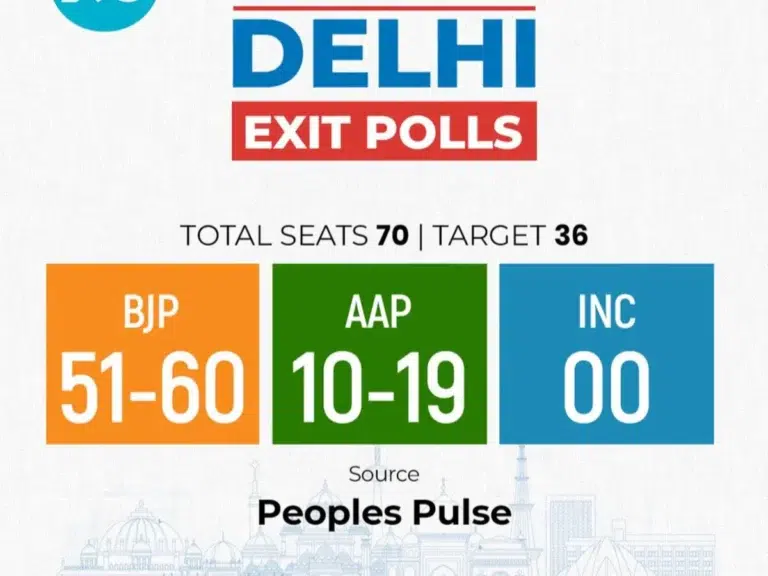Polls for Delhi’s 2025 Assembly Elections show a fractious political landscape in the national capital, but indicate a clear preference for the Bharatiya Janata Party (BJP) over the ruling Aam Aadmi Party (AAP). The elections to the Delhi Assembly are significant not just because they will decide who governs one of the most politically volatile regions in India, but because they reflect the broader political mood in a city that has seen dramatic shifts in political loyalties over the past decade.
Most exit polls after the election have predicted a comfortable win—if not a landslide—for the BJP, signaling a return to power for the party after a long absence from government in Delhi. This would mark a major shift from the last two elections, when AAP, led by Arvind Kejriwal, scored sweeping victories and radically changed the city’s political landscape.
Delhi Exit Polls Predict Massive BJP Victory in Delhi
But what stands out among the polls is Peoples Pulse’s bold prediction of a landslide for the BJP. According to its exit poll, the BJP could win 51 to 60 seats while AAP could win 10 to 19 seats. This prediction suggests that there is a huge shift in voters, which can be attributed to dissatisfaction with AAP’s governance, BJP’s appeal on a national level and effective campaigning.
Chanakya Strategies too added to the BJP’s resurgence story in Delhi by estimating 39 to 44 seats, a big jump from previous results. It projected 25 to 28 seats for AAP, better than Peoples Pulse’s estimate but showing AAP’s stronghold weakening.
But not all polls have bought the narrative of a thumping victory for BJP. Matrize, for example, paints a different picture and predicts a much closer fight. Matrize says BJP could win 35 to 40 seats while AAP could finish second with 32 to 37 seats. That would be a neck-and-neck fight. That could mean voters are divided or there could be a spurt of support for one party at the last moment.
These exit polls collectively highlight several underlying themes in Delhi’s political arena:
- Voter Sentiment: There seems to be a shift in voter preferences, perhaps prompted by developments at the national level, concerns about governance or changes in the composition of local leadership. The BJP’s predicted seat range reflects either a robust base of voters or a shift of votes from those previously distributed among minor parties or those who abstained.
- AAP’s Challenge: For AAP, these projections pose a challenge. After two consecutive terms in which they had essentially dominated the Delhi Assembly, any fall in seats would indicate a fall in voter confidence or satisfaction with their performance, owing to various controversies, policy implementations or electoral fatigue.
- Congress’ Diminishing Role: It was not covered in detail in these polls, but the Congress seems to be continuing its decline in Delhi, with no major seat projections for them. This is a part of a larger story of Congress struggling for relevance in states where regional/national parties have taken over.
- Exit Poll Reliability: But one must take these exit poll predictions with a pinch of salt. In the case of Delhi elections, we know that exit polls are not always right, especially in the case of AAP. In 2015 and 2020, exit polls underestimated AAP’s performance. So, while these polls give a sense of voter sentiment, they are not a forecast.
- Political Implications: If the BJP does come back to power in Delhi, as most polls predict, it will be a huge morale boost for the party and a tactical victory ahead of the national elections. But even a close contest or AAP win will underline the party’s tenacity and Kejriwal’s personal appeal in urban governance.
Lastly, as Delhi awaits the official counting on February 8, 2025, these exit polls have set the stage for a potentially dramatic change in the city’s political narrative. Whether these predictions prove accurate remains to be seen, but they certainly add layers of excitement and anticipation to the democratic process in India’s capital.




